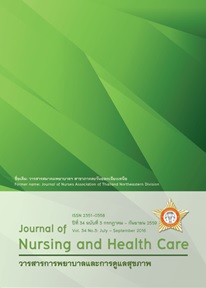ความสัมพันธ์ระหว่างความรู้ ทัศนคติ ความเชื่อเกี่ยวกับการคุมกำเนิดกับพฤติกรรม การคุมกำเนิดของกลุ่มแรงงานข้ามชาติในเขตจังหวัดภาคเหนือตอนบน The Relationships among Knowledge Attitude Belief about Contraceptive and Contraceptive Behavior of Migrant Workers i
คำสำคัญ:
ความรู้ ทัศนคติ ความเชื่อ พฤติกรรมการคุมกำเนิด แรงงานข้ามชาติ knowledge, attitude, belief, contraceptive behavior, migrant workersบทคัดย่อ
บทคัดย่อ
การวิจัยเชิงพรรณนาครั้งนี้ มีวัตถุประสงค์เพื่อศึกษาความสัมพันธ์ระหว่างความรู้ ทัศนคติความเชื่อเกี่ยวกับการ
คุมกำเนิดกับพฤติกรรมการคุมกำเนิดของกลุ่มแรงงานข้ามชาติในเขตจังหวัดภาคเหนือตอนบน กลุ่มตัวอย่างคือ แรงงาน
ข้ามชาติสัญชาติพม่า ลาว กัมพูชา ที่เข้ามาทำงานในเขตจังหวัดภาคเหนือตอนบนจำนวน 400 คน เก็บรวบรวมข้อมูลโดยใช้แบบสอบถามและวิเคราะห์ข้อมูลโดยใช้สถิติเชิงพรรณนา ทดสอบไคว์สแควร์ และหาค่าสัมประสิทธิ์สหสัมพันธ์ของเพียร์สันผลการศึกษาพบว่า กลุ่มแรงงานข้ามชาติมีการคุมกำเนิดร้อยละ 56.3 เพศหญิงมีการคุมกำเนิดมากกว่าเพศชายส่วนใหญ่ใช้ยาเม็ดคุมกำเนิด มีพฤติกรรมการใช้ยาเม็ดคุมกำเนิดที่ถูกต้องอยู่ในระดับปานกลาง เหตุผลที่เลือกใช้ยาเม็ดคุมกำเนิดคือ หาซื้อง่าย ไม่ตอ้ งไปโรงพยาบาล แรงงานขา้ มชาติสว่ นใหญมี่ระดับความรู ้ ทัศนคติ และความเชื่อเกี่ยวกับการคุมกำเนิดอยู่ในระดับปานกลาง ( = 12.38, SD = 2.79, = 40.06, SD = 8.16 และ = 33.57, SD = 6.04 ตามลำดับ) และยังมีความเชื่อด้านลบต่อการคุมกำเนิด ได้แก่ การคุมกำเนิดทำให้อ้วน การทำหมันทำให้สมรรถภาพทางเพศลดลง และการใช้ถุงยางอนามัยทำให้ความสุขทางเพศลดลง นอกจากนี้กลุ่มผู้ใช้แรงงานส่วนใหญ่ยังมีความคิดเห็นว่าการคุมกำเนิดเป็นหน้าที่ของผู้หญิงเท่านั้น ระดับความรู้ไม่มีความสัมพันธ์กับการเลือกคุมกำเนิด แต่ทัศนคติและความเชื่อเกี่ยวกับการคุมกำเนิดมีความสัมพันธก์ ับการเลือกคุมกำเนิดของกลุม่ แรงงานขา้ มชาติอยา่ งมีนัยสำคัญทางสถิติ (p < .05) จากผลการศึกษาสามารถนำไปเป็นข้อมูลพื้นฐานแก่บุคลากรหรือหน่วยงานที่เกี่ยวข้องในการให้ความรู้ที่ถูกต้องและครอบคลุมเกี่ยวกับการคุมกำเนิด โดยตระหนักถึงทัศนคติและความเชื่อเกี่ยวกับการคุมกำเนิดของกลุม่ แรงงานขา้ มชาติ และสง่ เสริมใหเ้ พศชายได้มีส่วนร่วมในการวางแผนครอบครัวและการคุมกำเนิด
Abstract
This descriptive research aimed to study relationships among knowledge, attitudes, and belief about contraceptive and contraceptive behavior of migrant workers in the upper Northern provinces. Study sample included 400 Burmese,Laos and Cambodian migrant workers who legally worked in the upper Northern provinces. Data were collected
by questionnaires administration and analyzed using descriptive statistics, Chi-square test, and Pearson’s correlation coefficient calculation.Findings revealed that 56.3% of migrant workers were having contraception, predominantly female. Contraceptive pills were mostly used with moderate level of proper contraceptive behavior. The reason for using ontraceptive pills was its affordability and needless to meet with health professional. Majority of the samples had moderate level of knowledge, attitudes, and beliefs about contraception ( = 12.38, SD = 2.79, = 40.06, SD=8.16, and = 33.57, SD = 6.04, respectively). They also had negative beliefs regarding contraception in terms of its effects on increased body weight, sexual dysfunction from sterilization, and sexual pleasure reduction from condom use.Additionally, the majority of migrant workers viewed that contraception was female’s responsibility. Contraceptive
were significantly associated with the contraceptive choices among the migrants (p <.05). Findings from the present study can be used as the basis for health personnel or related agency to provide appropriate and comprehensive information of contraception with the awareness of contraceptive attitudes and beliefs among migrant workers. Male migrants should be encouraged to involve in family planning and contraception, accordingly to the study findings.



